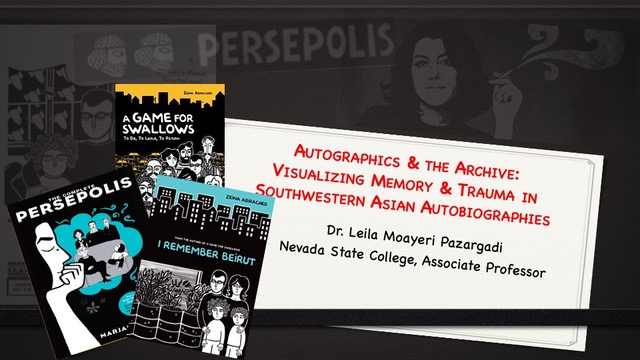Notice! This event has passed.
"Autographics & The Archive: Visualizing Memory & Trauma in Southwestern Asian Graphic Memoirs" by Prof. Leila Pazargadi
Please join us on Monday, March 15, 2021, 3:00 pm PST for a talk titled "Autographics & The Archive: Visualizing Memory & Trauma in Southwestern Asian Graphic Memoirs" by Prof. Leila Pazargadi (Nevada State University).
To register for this webinar, click here: (https://uci.zoom.us/webinar/register/WN_-3V3QOwOR8yPEbSXwczdww)
Drawing on the aesthetics of the comics form as well as conventions of autobiographical theory and its relation to storytelling, this talk discusses the way in which Marjane Satrapi’s Persepolis and Zeina Abirached’s I Remember Beirut attempt to confront and preserve memory and trauma from creative vantage points in their respective autographics.Since its reformulation as a historical and autobiographical storytelling tool in Art Spiegelman’s serialization of the Holocaust in Maus (1980), the comics form has allowed political storytellers to engage in revisiting, recreating, and retelling memories of trauma bound up in resistance movements. In Marjane Satrapi’s Persepolis and Zeina Abirached’s I Remember Beirut, the authors respectively employ the visual form of comics to revisit the 1979 Iranian Revolution and the Lebanese Civil War (1975-1990). Persepolis tells the story of Marjane’s life throughout the revolution, her move to Vienna, return to Iran, and eventual immigration to France. Similarly, I Remember Beirut recalls Zeina’s navigation of the Lebanese Civil War as it religiously demarcated Beirut before her subsequent move to France. These political conflicts are not only regionally and temporally parallel, but their similar representations in these two texts are striking, particularly as themes of resistance, violence, trauma, and nation-making are visually cued through the dramatic, yet simplified form of comics. Drawing on the aesthetics of the comics form as well as conventions of autobiographical theory and its relation to storytelling, this talk discusses the way in which transnational Southwestern Asian literature produced in the diaspora, attempts to confront exile, migration, displacement, and civil war from creative vantage points. Through the employment of techniques like the Belgian clear line and black-and-white storyboarding, these texts simplify the representation of violence to paradoxically draw attention to the stark realities and devastating effects of conflict on the storyteller and the world around them. The genres of life writing, storytelling, and comics converge to offer a new aesthetic capable of representing the nuances of Southwestern Asian political conflicts in the form of resistance literature.
Leila Moayeri Pazargadi is Associate Professor of English at Nevada State College, teaching composition, postcolonial literature, life writing, ethnic American literature, and Southwestern Asian literature courses. She received her Doctorate of Philosophy in Comparative Literature with a certification in Gender Studies from the University of California, Los Angeles in 2012. Her research focuses on Southwestern Asian women writers producing autobiographical material in fiction and nonfiction after 9/11, but it also extends to include scholarship on the visual forms of comics, in addition to Persian photography of the Qajar era. In 2020, she was a Visiting Scholar at UCLA’s Center for Near Eastern Studies researching her upcoming monograph on Southwestern Asian women’s memoirs.
This event is presented by UCI Jordan Center for Persian Studies & Culture.




Center for Persian Studies and Culture Mar 15 2021 | 3:00 PM - 4:30 PM Zoom